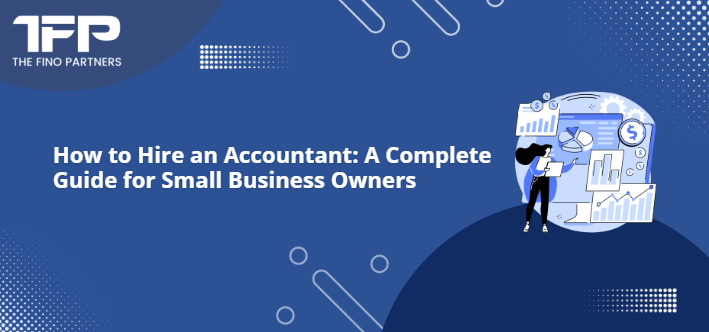Whether you’re starting a new business or accelerating an existing one, financial decisions can help or hinder your growth strategy. This is why learning how to hire an accountant is one of the smartest moves to make. The right accountant doesn’t simply file your taxes — he or she offers insights that can save you money, help you stay compliant, and keep your business headed toward profitability.
In this in-depth guide, we’ll take you through every part of the process, from determining your needs to asking the right questions in interviews, so that you can hire with confidence.
Why Is It Important to Hire the Right Accountant?
In the interest of saving money, many small business owners attempt to handle finances themselves, only to find later that implementing fixes is costing them more. They are also up to date on local and federal regulations so that you can rest easy knowing your business is compliant.
Learning how to hire an accountant helps you access assistance in vital areas such as:
- Business budgeting
- Cash flow management
- Tax filing and planning
- Bookkeeping services
- Audit preparation
- Financial forecasting
An expert accountant can even help you obtain loans or investors by preparing accurate and complete financial statements.
Key Steps on How to Hire an Accountant
Step 1 – Define Your Business Needs
First, decide what kind of financial assistance you require. Other businesses just need assistance at tax time, and others need support throughout the year.
Ask yourself:
- Do I want bookkeeping or full-service financial management?
- Do I need assistance with payroll processing?
- Do I need accounting counsel that’s specific to my industry?
These questions will help you bring in professionals with the right skills.
Step 2 – Choose the Right Type of Accountant
“Accountant” is an umbrella term for a range of professionals. Your choice will depend on how complicated your finances are:
- Certified Public Accountants (CPAs): State-board-licensed, extremely well-trained. Perfect for full-service and tax representation.
- Enrolled Agents (EAs): Licensed by the IRS to provide tax-related services.
- Bookkeepers: Account for day-to-day financial transactions. Best for small businesses that don’t require tax filing or auditing assistance.
Also, for most small-to-medium businesses, a CPA is a great pick for the versatility and qualifications.
Step 3 — Find Experience Relevant to Your Industry
Every sector has its financial foibles. Restaurants, for example, have challenges with inventory turnover and tipping laws, and construction companies need to monitor job costing and contracts. Look for an accountant who understands your business model so that they can provide you with more tailored advice.
Look for platforms such as LinkedIn, Upwork or other industry-specific accounting networks to help connect you to the right professionals.
Step 4 — The Structure of Fees
An accountant is an investment in yourself. Know how their services are priced:
- This can go from $100 to $300/hour based on experience and region.
- You may be offered flat-rate packages for common services, such as filing taxes or preparing monthly reports.
- If you require continued services, monthly retainers work best.
Clarify what is included in the quoted price and work to eliminate hidden fees.
Step 5 – Check Credentials and Reviews
It’s important to check qualifications. You can:
- Look up your state’s CPA licensing board.
- To find EAs, use the IRS Directory of Federal Tax Return Preparers.
- Look for reviews and testimonials on platforms like Yelp, Google Business, or Indeed.
Request references and reach out to one or two current or former clients to see what their experience has been like with the accountant’s communication style and reliability.
Step 6 – Interview Shortlisted Candidates
Develop a list of questions you can use to determine how well a candidate matches your requirements.
Sample questions to ask:
- What industries do you serve?
- What accounting software do you use?
- What do you do to keep up with tax law changes?
- What are your methods for ensuring client confidentiality?
- When are your busiest seasons and what is your availability?
The answers allow you to assess both technical capability and communication style.
Red Flags to Watch For
An accountant is only as good as the information they have. Some red flags to watch for as you hire are:
- Vague or inconsistent responses regarding their credentials
- The promise of “massive” tax savings without examining your finances
- References are unwilling to give
- Have no experience in the business that you are going to run
- Failing to communicate well or meet deadlines
An incorrect hire can cost you more than a dollar—it can be painful to your reputation and better business position.
Tool & Tech: What You Should Be Ready For
These days, accountants are frequently using cloud-based platforms such as:
- QuickBooks Online
- Xero
- FreshBooks
- Wave Accounting
If a tool is already in place for your business, ensure that the accountant is knowledgeable in that area. Even better, find someone who can help you automate things like expense tracking and invoicing.
Also Read | 10 Signs You Should Hire an Accountant for Personal Finance
Conclusion
If you’ve gotten this far, you know why it is important to know how to hire an accountant. It’s more than just filling a role; it’s about placing a strategic financial partner into your business. From outlining business needs to interviewing the right ones, each step helps you identify someone who will protect, guide, and grow your finances.
Do your research, ask the questions and trust your gut. A good accountant can save you money and trouble while helping you better plan for the future of your business.




























